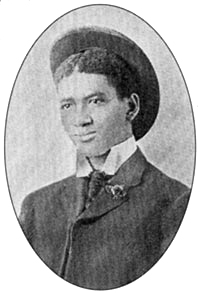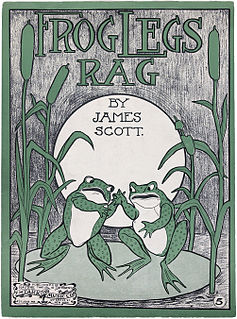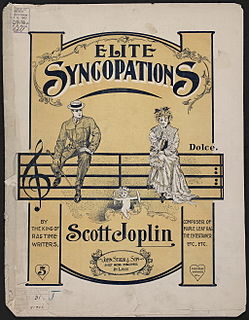Ragtime – also spelled rag-time or rag time – is a musical style that enjoyed its peak popularity between 1895 and 1919. Its cardinal trait is its syncopated or "ragged" rhythm.

Scott Joplin was an African-American composer and pianist. Joplin is also known as the "King of Ragtime" because of the fame achieved for his ragtime compositions, music that was born out of the African-American community. During his brief career, he wrote over 100 original ragtime pieces, one ragtime ballet, and two operas. One of his first and most popular pieces, the "Maple Leaf Rag", became ragtime's first and most influential hit, and has been recognized as the archetypal rag.

Joseph Francis Lamb was an American composer of ragtime music. Lamb, of Irish descent, was the only non-African American of the "Big Three" composers of classical ragtime, the other two being Scott Joplin and James Scott. The ragtime of Joseph Lamb ranges from standard popular fare to complex and highly engaging. His use of long phrases was influenced by classical works he had learned from his sister and others while growing up, but his sense of structure was potentially derived from his study of Joplin's piano rags. By the time he added some polish to his later works in the 1950s, Lamb had mastered the classic rag genre in a way that almost no other composer was able to approach at that time, and continued to play it passably as well, as evidenced by at least two separate recordings done in his home, as well as a few recorded interviews.

James Sylvester Scott was an American ragtime composer and pianist, regarded as one of the three most important composers of classic ragtime, along with Scott Joplin and Joseph Lamb.

The "Maple Leaf Rag" is an early ragtime musical composition for piano composed by Scott Joplin. It was one of Joplin's early works, and became the model for ragtime compositions by subsequent composers. It is one of the most famous of all ragtime pieces. As a result, Joplin became dubbed the "King of Ragtime" by his contemporaries. The piece gave Joplin a steady if unspectacular income for the rest of his life.
Classic rag is the style of ragtime composition pioneered by Scott Joplin and the Missouri school of ragtime composers. These compositions were first considered "classic" by Joplin's publisher, John Stark, as a way to distinguish them from what he considered the "common" rags of other publishers. Today, any composition fitting this particular ragtime structural form is considered classic rag.
Etilmon Justus Stark was an American ragtime composer and arranger, the eldest son of ragtime publisher John Stark. His best-known work includes the rag time pieces "Trombone Johnsen" (1902), "Billiken Rag" (1913), and "Gum Shoe" (1917), and the arrangements for the collection "Fifteen Standard High Class Rags" (1912).

"The Entertainer" is a 1902 classic piano rag written by Scott Joplin. It was sold first as sheet music, and in the 1910s as piano rolls that would play on player pianos. The first recording was by blues and ragtime musicians the Blue Boys in 1928, played on mandolin and guitar.

The "Swipesy Cakewalk" is a ragtime composition written in 1900 by a musical duo consisting of the notable ragtime master Scott Joplin, who composed the trio, and the young composer Arthur Marshall, who composed the rest of the piece. "Swipesy" uses the simple syncopations of a cakewalk - the first beat being a sixteenth, eighth, sixteenth note division, and the second beat an even eighth note division. The style follows the AA BB A CC DD musical form common for both cakewalks and rags, particularly after the earlier publication of Joplin's hit "Maple Leaf Rag". Only the C section, composed by Joplin, departs from the cakewalk rhythm and is more pure ragtime. The composition was written in the late 1890s when Joplin was living with the Marshall family, and was teaching Arthur, composition.

"Magnetic Rag" is a 1914 ragtime piano composition by American composer Scott Joplin. It is significant for being the last rag which Joplin published in his lifetime, three years before his death in 1917. It is also unique in form and in some of the musical techniques employed in the composition.

"Original Rags" was an early ragtime medley for piano. It was the first of Scott Joplin's rags to appear in print, in early 1899, preceding his "Maple Leaf Rag" by half a year.

"Frog Legs Rag" is a classic rag composed by James Scott and published by John Stillwell Stark in December 1906. It was James Scott's first commercial success. Prior to this composition Scott had published marches. With "Frog Legs Rag", Scott embarked upon a career as a successful and important ragtime songwriter.

"Bethena, A Concert Waltz" is a composition by Scott Joplin. It was the first Joplin work since his wife Freddie's death on September 10, 1904 of pneumonia, ten weeks after their wedding. At the time the composer had significant financial problems; the work did not sell successfully at the time of publication and was soon neglected and forgotten. It was rediscovered as a result of the Joplin revival in the 1970s and has received acclaim from Joplin's biographers and other critics. The piece combines two different styles of music, the classical waltz and the rag, and has been seen as demonstrating Joplin's excellence as a classical composer. The work has been described as "an enchantingly beautiful piece that is among the greatest of Ragtime Waltzes", a "masterpiece", and "Joplin's finest waltz".

"The Easy Winners" is a ragtime composition by Scott Joplin. One of his most popular works, it was one of the four that had been recorded as of 1940.

"Sunflower Slow Drag" is a ragtime composition by Scott Joplin and Scott Hayden. It is about four minutes long and has been described as "full of gaiety and sunshine".

"The Ragtime Dance" is a piece of ragtime music by Scott Joplin, first published in 1902.
Trebor Jay Tichenor was a recognized authority on Scott Joplin and the ragtime era. He collected and published others' ragtime piano compositions and composed his own. He authored books about ragtime, and both on his own and as a member of The St. Louis Ragtimers, became a widely known ragtime pianist.

The "Searchlight Rag" is a ragtime composition by Scott Joplin, first published in 1907. It was named after the town of Searchlight, Nevada, where his friends had gone prospecting, inspiring the title.

"Elite Syncopations" is a 1902 ragtime piano composition by American composer Scott Joplin, originally published in 1903 by John Stark & Son. One of his more popular works, it is one of a handful of Joplin's rags for which he recorded a piano roll. The cover of the original sheet music prominently features a well-dressed man and lady sitting on a treble staff, looking down upon a cherub clutching a cymbal in each hand, which reflects plainly the title of the piece. In 1974, the British Royal Ballet, under director Kenneth MacMillan, created the ballet Elite Syncopations based on tunes by Joplin and other composers of the era.















